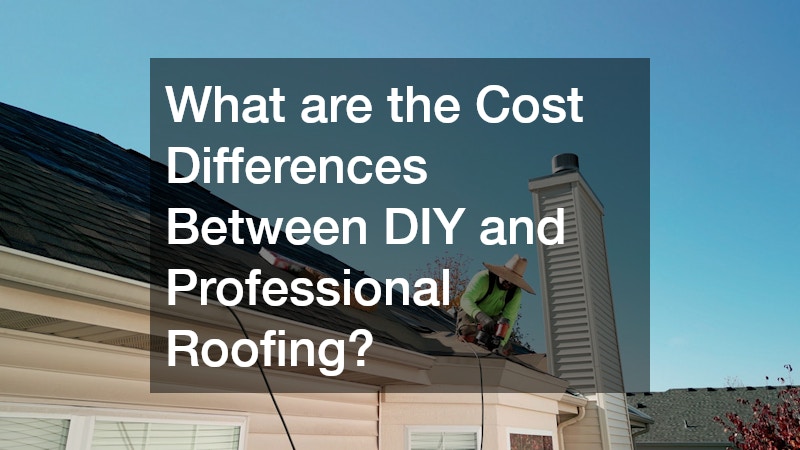Understanding when to tackle a roofing project yourself and when to call in the professionals can save time, money, and stress. This article explores key considerations for deciding between DIY roofing and hiring a professional roofing company. Homeowners frequently face the dilemma of managing a roofing project independently or involving professional expertise.
Proper assessment is crucial as both options have distinct advantages and disadvantages.
When is DIY Roofing a Safe Option?
Learn about the types of roofing tasks that a homeowner can safely execute and what skills are necessary to ensure a successful DIY project. Knowledgeable homeowners with the right tools can often undertake simple tasks like clearing debris or unclogging gutters. Moreover, minor repairs such as replacing a few shingles or applying sealant can be managed with proper guidance and preparation.
Attempting to repair localized damage on flat or gently sloping roofs can be suitable for a DIY job if proper safety measures are followed. Building confidence in handling tools and understanding roofing materials is essential for any homeowner considering DIY roofing tasks. Assessing your comfort level and personal ability to handle a project thoroughly is necessary before deciding on the DIY approach.
Before proceeding with DIY roofing, homeowners must carefully evaluate weather conditions and potential risks associated with the project. To avoid potential setbacks, homeowners must understand the limits of their skills and knowledge. Recognizing when a task may be beyond personal capability is vital in preventing costly errors or hazardous situations.
What are the Risks of DIY Roofing?
Explore the common pitfalls of DIY roofing, including personal safety hazards and the potential for causing damage that could lead to more costly repairs. Climbing ladders and working at heights pose significant risks of falls and injuries if proper precautions are not observed. Inadequate or incorrect materials usage can lead to ineffective repairs, potentially worsening the problem.
Lack of expertise in identifying hidden structural issues can exacerbate existing damage, leading to more extensive repairs. DIY errors could lead to voided warranties on roofing materials due to improper installation, resulting in financial loss. The absence of professional tools and equipment may compromise the quality and durability of a repair or installation.
Improper handling of roofing materials can inadvertently void insurance claims in the event of subsequent damages or leaks. Homeowners may inadvertently neglect building codes or regulations, potentially resulting in fines or additional work. Delaying professional intervention because of incorrect DIY endeavors can escalate repair costs significantly.
How to Choose the Right Roofing Professional?
Discover what to look for in a professional roofing contractor, including credentials, experience, and how to assess their reliability and quality of service. Begin by verifying the contractor’s license and checking their standing with local licensing boards. Insurance coverage is essential to protect the contractor and homeowner from potential liabilities during the project.
Reviewing past projects and seeking testimonials are effective methods of gauge a contractor’s experience and workmanship quality. A reputable contractor should willingly offer references from previous clients, showcasing their reliability and expertise. Engaging a contractor with a varied portfolio signifies their ability to adapt to roofing challenges.
Clear and comprehensive estimates help compare pricing and understand the scope of work involved. Ensuring positive communication and transparency in the bidding process indicates professionalism. Assessing the contractor’s approach towards safety protocols underlines their prioritization of the well-being of both workers and clients.
What are the Cost Differences Between DIY and Professional Roofing?

Examine the financial implications of DIY versus professional roofing, considering both immediate costs and potential long-term savings or expenses. DIY projects may initially appear cost-effective due to the absence of labor charges. However, the risks of faulty installations can translate into unforeseen expenses for corrections and repairs.
Professional roofing ensures that the work is done correctly from the start, which can prevent long-term repair costs. Investing in professional services can increase the property’s value due to the assurance of quality work and durable materials. Professional warranties offer peace of mind, potentially saving costs for future repairs or replacements.
While DIY roofing might initially seem budget-friendly, hidden costs such as tool rentals and material waste can arise. Extensive projects often require specialized knowledge that only experienced professionals can deliver efficiently within a budget. Making a well-informed choice between DIY and professional services is essential in safeguarding against immediate and future financial strain.
Weighing the pros and cons of DIY versus professional roofing, this article has provided insights into making an informed decision that ensures safety, quality, and cost-effectiveness. With this information, you can confidently decide when to call a roofing company or when a DIY approach is suitable. By understanding the complexities involved and each option’s inherent risks and costs, homeowners can better align their decisions with their financial constraints and safety preferences. The choice between DIY and professional roofing ultimately depends on the project’s scope, your confidence in handling it, and the risks you are willing to undertake.
